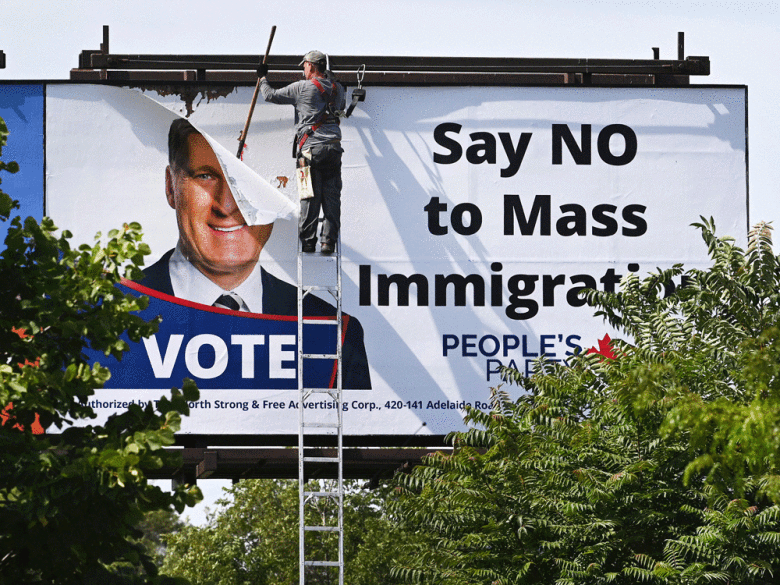I offer sarcastic congratulations to everyone who gave Maxime Bernier the stupid controversy he wanted over the “Say NO to mass immigration” billboard, bearing his image, that briefly appeared in a few Canadian cities and was taken down in a hurry Monday morning. The billboards were purchased from Pattison Outdoor Advertising by a third-party supporter of Bernier’s People’s Party. The company’s initial response to the resulting outcry was to observe that the message of the billboard complied with advertising standards; it did not contain any hateful, disparaging, or discriminatory language.
“We take a neutral position on ads that comply with the ASC (Advertising Standards Canada) Code as we believe Canadians do not want us to be the judge or arbiter of what the public can or cannot see,” was Pattison’s original statement in the face of controversy. (Most everybody, including the company, seems to have missed the point that election advertising is explicitly “excluded from the application” of the Code on the grounds that political expression deserves the highest degree of deference; the Code does say, for what it’s worth, that “Canadians are entitled to expect” that such advertising respects the underlying principles.)
Pattison’s in-house advertising code does allow the company to engage in “post-publication review,” which must necessarily involve just dismantling ads if enough people raise hell about them, and this is what has now happened. This has not stopped people from threatening boycotts against the Pattison corporate empire for accepting the ad in the first place, or for bowing to pressure from the people who were angry about the ad. Take your pick if that’s your idea of a good time.
Let’s accept the view for the sake of argument, or just for the sake of sanity, that there is no general freedom-of-expression issue involved here. A vendor of advertising space cannot completely disavow responsibility for the ads it accepts, and any ad will be condemned if the social force aligned against it is commercially unbearable. My question is whether it was sensible for individuals (ah, remember them?) to oppose the display of this particular ad, as opposed to walking past it, perhaps frowning, and going about one’s business. Bernier has said he has no connection with the billboard, but that he agrees with its message; and now he accuses a “leftist mob” of trying “to censor any discussion of immigration”.
How can this now be answered by opponents of the billboard? They can say that they’re not a mob, I suppose; not a mob, just a large, angry group of citizens acting impulsively in concert to destroy something that offends them. But the billboard didn’t say that immigrants are horrid. It didn’t say anything for or against ethnic diversity, which Bernier has praised in the past while objecting to its elevation to cult status. It didn’t propose throwing anybody out of Canada. It is a plea against a long-standing policy of mass immigration.
My question is whether it was sensible for individuals to oppose the display of this particular ad, as opposed to walking past it, perhaps frowning, and going about one's business
Some would have us believe that this is the point: that the million immigrants Canada is welcoming every three years, thereby outdistancing the industrialized world, do not constitute a “mass.” Crusading Edmonton lawyer Avnish Nanda took this line in an interview with the Calgary Herald’s Sammy Hudes: “First and foremost, (the billboard) contains a lie. There’s no mass immigration to Canada. There’s no threat of mass immigration.”
I suppose “mass immigration” really is a context-sensitive kind of thing to say. In a scenario in which Canada was airlifting large numbers of desperate people from a particular situation (he said, stealing a nauseous glance at Hong Kong), a few thousand immigrants might easily be enough to make up a “mass.” By the same token, the influx of self-selected immigrants that Canada accepts from all corners of the world might not be a “mass.”
But … it’s a fine point, and we are certainly taking in an awful lot of people in the most banal sense of “a lot.” Can the alleged inaccuracy of the billboard really have been the “first and foremost” objection to it? Mr. Nanda and those like him suggest they are angry about the billboard because it urges Canadians to say “No” to something that’s not happening and cannot happen. I would suggest that their objection to the billboard is nothing more or less than disagreement with its political premise.
The question I have for objectors and denouncers of the billboard is how they think it could have been rewritten, expressing the same underlying idea, so as to be acceptable. If the unpleasant-sounding word “mass” were replaced with “large-scale,” would there have been less of a ruction? Maybe any objection to prospective levels of immigration to Canada is to be regarded as inherently racist and hateful, even when no racist or hateful language is used.
If that is the case, it is perfectly predictable that the People’s Party will exploit this and cry “mob censorship,” and public polls on immigration suggest they will have some success, in case recent history everywhere didn’t offer enough of a hint. Moreover, we are left with an awkward question how any limit upon or criteria for immigration, any government immigration policy per se, can be justified at all. What, indeed, can be the objection to “mass immigration”? Who will have the courage to put up a “Say YES to mass immigration” billboard?
Twitter: colbycosh





























